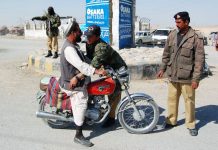
Bara, Khyber Agency: After a decade of debilitating militancy that destroyed most of the infrastructure in the Khyber Agency, government run schools and colleges are gradually reopening in the restive tribal district along the Pakistan-Afghanistan border.
According to the agency education authorities, a total of 102 schools – both boys and girls – have been destroyed during the ten-year-long militancy in the Bara subdivision. There are around 400 schools and colleges in the Bara tehsil. Around 64,000 students have abandoned education, either fleeing to safer places or because their village schools in Bara were destroyed.
Khyber Agency, one of the seven tribal agencies along the Pakistan-Afghanistan border, has remained volatile since 2001. Along with conflict, militancy and attacks on NATO supplies going into Afghanistan through routes in the Khyber Agency, thousands of people have been displaced from the agency in recent months in the wake of military operations against militants there.
The decision to reopen the schools came after the authorities claimed to have cleared the area of militants after several military operations and restored peace and government’s writ in the region.
The Bara subdivision of Khyber Agency is among the areas worst hit by militancy. Hundreds of government-run primary, middle, high, higher secondary and collages in Bara had been closed down either by the government due to conflict or due to militant attacks on schools.
Dozens of the schools, including those for girls, were destroyed in bombing claimed by militants or operations carried out by the security forces against Taliban and other anti-state elements in the area.
Nasir Khan, the Assistant Political Agent (APA) who is the administrative officer in-charge of all departments in the subdivision including education, told News Lens Pakistan that the government had reopened several schools in Bar Qambarkhel area of Bara.
He said the education staff that had been redeployed due to militancy in other areas of Khyber Agency was notified to report back to their schools in Bara tehsil.
Khan said all teaching and non-teaching staff was directed to report to their line-manager within a week or else disciplinary action would be taken against them.
“We have provided tents and other materials to 80 per cent of damaged and destroyed schools in Bara to keep education activities running until the school are rebuilt,” said Khan.
He said schools were still closed in a few areas in Bara that had yet to be cleared of militants.
Malik Waris Khan Afridi, former federal minister and a prominent tribal elder, appreciated the efforts of security forces and other government departments to restore peace Bara but said it would take time to reopen all the closed and destroyed schools in Bara.
“I don’t think even one percent of the total schools have remained safe in the brutal militancy that destroyed the social and economic fabric of the agency,” said Waris Khan.
He said that the local Sharishty (village peace committees) were working alongside security forces to bring normalcy to the area.
“It would be an exaggeration to say that all of the agency has been cleared of militants in the Khyber-1 military operation as air-strikes continue against militants in Bara Tehsil,” said the former minister belonging to the Pakistan People’s Party.
Waris hoped that the government was serious about wiping out militancy from the region and send back the displaced people to their villages and towns.
According to a local source who didn’t want to be named for security reasons, two boys and one girl school in Bar Qambarkhel area – one of the areas in Bara tehsil that share boundary with Jamrud and Peshawar and has been cleared of militants – have reopened.
He said schools in Bar Qambarkhel were imparting education to hundreds of schoolchildren without any hurdle. He said one school for boys accommodated around five hundreds children of the area which was encouraging for people who recently returned to their hometowns after peace was restored in Bara.
“Compared to Bar Qambarkhel, Qambarkhel,Sepah,Speen Drang,Shalobar and other areas surrounding Bara are quite unsafe where 90 per cent of school buildings and other installations have been destroyed in bomb blasts or action against militants,” said the source.
Arifullah Afridi, Press Secretary of the Private Schools Association in Bara, told News Lens Pakistan that alongside government-run schools, private schools were also reopening which, he said, was good for the students.
He said almost 80 per cent of the people had returned to Akakhel, Sheen Drang and Malikdinkhel areas of Bara subdivision where, according to him, all state-owned and private schools had reopened.
Afridi had registered 780 children in his school (Abu Bakkar Public school) till 18th January, 2015. He said thousands of school children had suffered due to militancy. Seven of his schoolchildren had lost their lives in militancy and military actions against militants in Bara.
“Six out of 72 private schools in Bara have been completely destroyed while 33 other schools were partially damaged in militancy since 2009,” said Afridi. He hoped the government would help rebuild them.
Afridi said schools in his village were provided foolproof security after the military purged militants out.
While the government has directed the education department to reopen the schools closed for almost a decade, there are concerns that the students will not return to their destroyed or partially damaged schools.
“I doubt if the students, who had been displaced with their families, would want to go back to schools established in tents after they return to their hometowns in Bara,” said a resident of Jamrud Town who didn’t want to be named.



